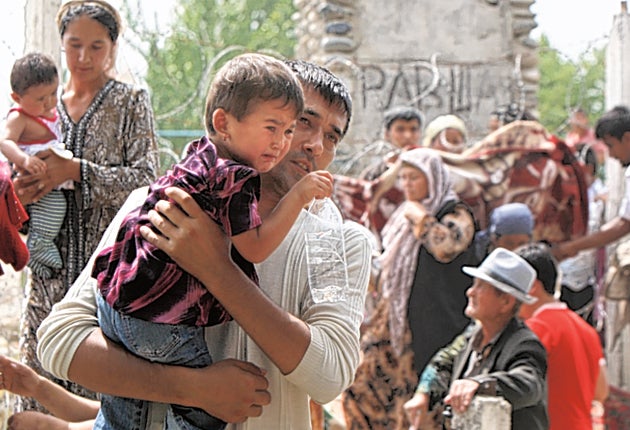400,000 displaced by Kyrgyz ethnic violence

As many as 400,000 people have been displaced by ethnic violence in southern Kyrgyzstan, the United Nations announced yesterday, dramatically increasing the official estimate of the impact of a crisis that has left refugees without enough food and water in camps on the Uzbekistani border.
Meanwhile, Uzbeks in the southern city of Osh claimed Kyrgyz men had sexually assaulted and beaten more than 10 Uzbek females – including pregnant women and girls as young as 12 – on a single street during the unrest.
In the Cheryomushki district, Matlyuba Akramova, a resident, showed journalists a 16-year-old relative who had been hiding in the attic of the family home while a Kyrgyz mob beat her father downstairs. At some point, Mr Akramova said, the girl tried to help her father and was sexually assaulted in front of him. However, Kyrgyz have denied accusations of such brutality and say Uzbeks have raped Kyrgyz women.
While many Kyrgyz were killed in the unrest, the majority of victims appear to have been Uzbeks – farmers and traders who have traditionally been more prosperous than the Kyrgyz, whose background is nomadic.
Odinama Matkadyrovna, an Uzbek doctor in Osh, said there probably had been more cases of rape, but many victims were reluctant to speak out for fear of dishonouring their families.
A spokeswoman for the UN humanitarian office, Elisabeth Byrs, said an estimated 300,000 people – from a population of 5.3 million – had been driven from their homes but remain in the country. She said there are now also about 100,000 refugees in Uzbekistan. The last official estimate of refugees who had fled the country was 75,000.
Kyrgyzstan's provisional government has accused the country's deposed president of igniting long-standing ethnic tensions by sending masked gunmen to shoot members of both groups. The provisional government, which overthrew President Kurmanbek Bakiyev in April, accuses the former leader of widespread corruption and says he and his supporters have been guilty of attempting to destabilise official control of the south and reassert their grip on the Afghan heroin trade. Some Uzbek witnesses have even alleged that Kyrgyz mobs were aided by military and police.
Ole Solvang, a Human Rights Watch researcher, said Kyrgyz troops were standing 200 metres from the Cheryomushki neighbourhood when the looting and killings started but didn't interfere. "This is an extreme failure on the part of the government to intervene and protect these people," he said.
But Colonel Iskander Ikramov, head of the Kyrgyz military in the south, rejected the allegations, adding that the army did not interfere because it was not supposed to act as a police force. A local man, Khasan Rakhimov, said soldiers had driven an armoured personnel carrier into the area and cleared the way for Kyrgyz attackers. "They shot at all who put up resistance," he said of the troops.
Yesterday the deputy chief of the provisional government, Azimbek Beknazarov, said that authorities had strengthened roadblocks on all entrances into the capital, Bishkek, and tightened security in prisons to prevent Mr Bakiyev's clan from provoking turmoil in the north.
The official death toll is 223, but it's thought the figure could be significantly higher.
Subscribe to Independent Premium to bookmark this article
Want to bookmark your favourite articles and stories to read or reference later? Start your Independent Premium subscription today.

Join our commenting forum
Join thought-provoking conversations, follow other Independent readers and see their replies